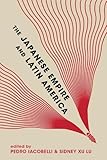The Japanese Empire and Latin America / ed. by Sidney Xu Lu, Pedro Iacobelli.
Material type: TextPublisher: Honolulu : University of Hawaii Press, [2023]Copyright date: ©2023Description: 1 online resource (280 p.) : 13 b&w illustrationsContent type:
TextPublisher: Honolulu : University of Hawaii Press, [2023]Copyright date: ©2023Description: 1 online resource (280 p.) : 13 b&w illustrationsContent type: - 9780824894610
- 327.5208 23//eng/20220928eng
- online - DeGruyter
| Item type | Current library | Call number | URL | Status | Notes | Barcode | |
|---|---|---|---|---|---|---|---|
 eBook
eBook
|
Biblioteca "Angelicum" Pont. Univ. S.Tommaso d'Aquino Nuvola online | online - DeGruyter (Browse shelf(Opens below)) | Online access | Not for loan (Accesso limitato) | Accesso per gli utenti autorizzati / Access for authorized users | (dgr)9780824894610 |
Frontmatter -- Contents -- Introduction -- 1 Turning the Water into Fair Pools: Prewar Japan’s Paternalistic Outreach in Its South American Emigration Policy -- 2 Japanese Shipping Lines in Latin America, 1905–1941 -- 3 Toward a Prototype of the Total Empire: Japanese Migration to Brazil and Japanese Colonial Expansion in Asia, 1921–1934 -- 4 Transpacific Migration and Japan’s Extraterritorial Settler Colonialism in the US-Mexican Borderlands -- 5 The Immigrant-Homeland Connection: The Development of the Japanese Community in Peru -- 6 Guiding Settlers: The Overseas Development Company and the Recruitment of Rural Brazil, 1918–1936 -- 7 “South America Bound”: Japanese Settler Colonist Fiction of the Meiji Era -- 8 Chasing the Transnational Flow of Books and Magazines: Materials, Knowledge, and Network -- 9 Immigrant Propaganda: Translating Japanese Imperial Ideology into Argentine Nationalism -- 10 After the Empire: Postwar Emigration to the Dominican Republic and Economic Diplomacy -- 11 Were Issei in Brazil Imperialists? Emigration-Driven Expansionism in Nikkei Literature -- Bibliography -- Contributors -- Index
restricted access online access with authorization star
http://purl.org/coar/access_right/c_16ec
The Japanese Empire and Latin America provides a comprehensive analysis of the complicated relationship between Japanese migration and capital exportation to Latin America and the rise and fall of the empire in the Asia-Pacific region. It explains how Japan’s presence influenced the cultures and societies of Latin American countries and also explores the role of Latin America in the evolution of Japanese expansion. Together, this collection of essays presents a new narrative of the Japanese experience in Latin America by excavating transpacific perspectives that shed new light on the global significance of Japan’s colonialism and expansionism.The chapters cover a variety of topics, such as economic expansion, migration management, cross-border community making, the surge of pro-Japan propaganda in the Americas, the circulation of knowledge, and the representation of the “other" in Japanese and Latin American fictions. By focusing on both government action and individual experiences, the viewpoints examined create a complete analysis, including the roles the empire played in the process of settler identity formation in Latin America. While the colonialist and expansionist discourses in Japan set a stage for the beginning of Japanese migration to Latin America, it was the vibrant circulation of information between East Asia and the Americas that allowed the empire to stay at the center of the cultural life of communities on the other side of the globe. The empire left an enduring mark on Latin America that is hard to ignore. This volume explores long-neglected aspects of the Japanese global expansion; and thus, moves our understanding of the empire’s significance beyond Asia and rethinks its legacy in global history.
Mode of access: Internet via World Wide Web.
In English.
Description based on online resource; title from PDF title page (publisher's Web site, viewed 06. Mrz 2024)


